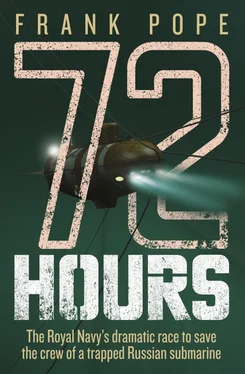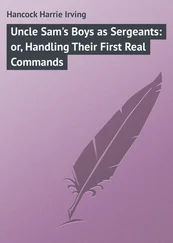Lepetyukha’s rheumy, bloodshot eyes swivelled slowly, trying to find Milachevsky. He grunted the young pilot’s name. Huddled against the horror in mind as well as body, Milachevsky didn’t respond until his name was spoken a second time.
Lepetyukha didn’t lift a finger, but swivelled his eyes slowly over to the remaining canister. Milachevsky understood, and began plotting his movements to pull himself within reach of the cylinder. Every lift of his arm felt as demanding as climbing one of the volcanoes that surrounded Petropavlovsk, and contemplating a sequence of such movements was daunting. But he set his jaw and began. When he at last reached the canister he squatted against the curved steel, closed his hand over the valve and twisted. The grip slid past his skin without shifting. He couldn’t summon enough strength to hold it tight enough to crack the seal.
Taking both hands, Milachevsky tried once again. Focusing all his attention on his hands, he managed to break the valve’s bond with the canister. Slumped against the wall, Milachevsky placed the V-64 carefully on the deck, and began to gather the energy for his return journey. Through his throbbing headache, he imagined he could feel the ache in his head lessen as the chemicals in the canister drew carbon dioxide from the air. The pain lifted slowly, but alongside the relief came realisation. His mind was becoming capable of thought once more, not just deadened reactions, and that thought brought dread. Once this canister was finished there would be no others to open. This time the slow suffocation would be final.
Sunday, 7 August
SS + 68 h 45 mins
01.15 UK – 04.15 Moscow – 13.15 Kamchatka
KIL-27 , 210 metres beneath Berezovya Bay
With continual communication between the control cabin and the deck crew, taking up umbilical slack and spooling out a little more, the movement caused by the swell and KIL-27 ’s wandering was all but cancelled out. Nuttall and Gold were in a zone of total concentration, barely having to talk to each other as they worked together to move in on the dwindling number of cables.
Podkapayev was nodding enthusiastically as Scorpio neared the fourth cable. Nuttall jockeyed the stick forward, compensating heavily for what he was presuming to be the strange effects of the low voltage, when something caught his attention from the corner of his eye. On the panel to the right of the joystick, a red light had started flashing on and off. Gold had also seen it in the same moment.
‘Oil level alarm,’ said Gold loudly, but to himself. This was exactly what he’d dreaded – something going wrong at this critical stage. The alarm indicated that the main termination box compensator was losing oil. There was no way of knowing how fast. The box – where the umbilical met the ROV itself – was filled with oil to keep seawater away from the electrical connections. Gold was running through the possible causes of a leak. Was the oil being forced up the umbilical, as it might if Scorpio hadn’t dived deep for a while? Was one of the bolts not tightened properly during their frantic efforts to get everything up and running again? Did something get trapped in the seal? Or was it just a false alarm caused by a fault in the circuit, one that could mean the difference between life and death if he chose to take it seriously. There was no way of telling without inspecting Scorpio.
Gold’s mind was running through the system, combining all the various factors and scenarios. The alarm circuit was rigged to warn that the oil reservoir for the main termination box was running low, yet he himself had made sure it was topped up when the vehicle left the surface. Scorpio had already been down for an hour and a half. There hadn’t been any hard impacts on the machine while it had been submerged, so he couldn’t imagine it was down to recent trauma. Assuming it was a constant loss and not a recent breach, that meant it was losing oil at a fairly slow rate. If so, it would be another hour before enough oil had leaked away to allow the first drops of seawater inside. There was always the chance that something else was wrong – especially given his experiences in the last eight hours on the ship – but Gold decided to trust the instincts that had evolved over 12 years’ working with the vehicle.
‘Ignore it for the moment, Pete. Let’s keep cutting.’ Gold’s voice was pure Scottish calm, but inside his stomach was turning knots.
With the red light pulsing like an opened artery, Nuttall and Gold moved in on the fourth rope and at 13.25 they made the cut. Two more lines remained, though neither was as accessible as those that had gone before.
Sunday, 7 August
SS + 69 h
01.30 UK – 04.30 Moscow – 13.30 Kamchatka
Georgy Kozmin , Berezovya Bay
The last pieces of Commander Kent Van Horn’s gear were finally completing the tortuous two-stage loading process on to the American ship of opportunity, the Georgy Kozmin. Once they’d all been loaded, he expected that the Kozmin would cast off and leave in short order. But nothing happened. When he approached Captain Novikov with the attaché alongside him, he was informed that they were still ‘waiting for permission’.
Five hours before, the Americans had got personal confirmation from Vice-Admiral Avdoshin of the Russian main Navy staff that the Kozmin was cleared to leave as soon as loading was complete, but for at least half an hour they waited on the dockside. Van Horn was sitting in one of the staterooms of the Kozmin discussing technical issues with the Russian officers and obliquely trying to break the deadlock that was preventing them from leaving. The impression of those on board that the authorities were trying to restrain Novikov seemed increasingly likely; it wouldn’t be until 15.00 local time that the ship was finally allowed to cast off from the dockside. With the site at least four hours away, the chances that they would reach the trapped sailors while they were still alive were fading.
Sunday, 7 August
SS + 69 h
01.30 UK – 04.30 Moscow – 13.30 Kamchatka
KIL-27 , Berezovya Bay
Standing on the bridge of KIL-27 with her beige raincoat wrapped tightly around her against the cold breeze, Tatiana Lepetyukha scanned the scene on the stern deck for clues as to what was happening. With her blonde hair and city clothes, she felt out of place, suddenly self-conscious about forcing herself on to the rescue ship. She’d been true to her word about not interfering, although she had not been able to restrain herself from putting a hand on one of the British sailors’ shoulders to say thank you for his work. He might not have been able to understand her, but that didn’t matter. She just needed to say it.
It was hard to tell what was happening from the postures of the foreigners as they crowded around the yellow cable that led to their machine, or from the faces of those going in and out of the control cabin. She badly wanted to get the latest news of the situation, but didn’t want to make more trouble by asking. The translator inside the robot’s control container was a friend of hers, but there was no way he could come out and give her a report at a time like this.
More transparent than the hard-to-read faces of the outsiders were those of the Russian Oxygen Rescue Team. They were preparing to treat her husband and the other sailors when – Tatiana’s inner voice promised her that it was when, not if – they were brought back to the surface. But the expressions of these medics were painful to watch, for every minute that passed they changed. It was just nerves, Tatiana told herself. The official Navy estimates of the remaining air supply were the ones that should be regarded, not the expressions of mere doctors.
Читать дальше












